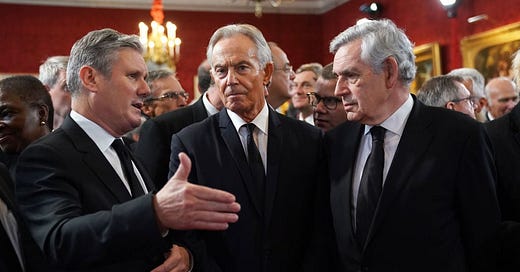Good morning. Keir Starmer will meet union leaders this afternoon to assuage fears the party is watering down its workers’ rights package, aka the New Deal for Working People. Here are two reasons to watch closely. First, it will tell us how much influence the trade unions have over Starmer’s Labour. Second, it is a key test of Angela Rayner’s power within the party.
But today: could Nigel Farage obliterate the Tories?
Then, Labour Together’s Josh Simons argues the party today is more Blairite than people think.
Rishi Sunak and Keir Starmer sound as if they speak differently on stage than they do in private. Nigel Farage does not. He sounds like a “normal person”. Notwithstanding his Dulwich days, his cadence, vocabulary and tenor is familiar to the average listener. Normal people do not speak about “mission-driven government” or “fiscal responsibility” or “AI-enabled public sector productivity gains”. If you think they do, then I have news: you are not normal.
At the same time, Farage can pre-empt changes in the political wind. He deftly moves from declaring China as the enemy in 2021, to posing in an anorak on the White Cliffs of Dover as a defender against migrant boats before either main party had taken notice. His antennae pick up the nation’s latent mood with MRI-level accuracy.
Which leads us to his third attribute: Farage is a modern man; he evolves with the times. He ferrets his way into issues that have nothing to do with him. His adaptability is driven by a desire for relevance. It’s an addiction that has been proven by his numerous attempts to retire, all of which failed.
This third attribute is why Tory MPs will have nervously observed a new JL Partners poll for the Sun that showed Farage’s return would take Reform to 16 per cent in the polls, pushing the Tories down to 21 points – which, according to the New Statesman’s model, would leave the Conservatives with a paltry 141 seats.
Farage’s Achilles heel has always been his limited attraction. Loads of people like him; more people do not. He repels a certain Cotswolds habitué with his off-colour remarks about Romanians and transatlantic love affair with Donald Trump, a man for whom democracy is like a ball of playdough: to be toyed with, stretched and moulded, but never taken seriously. This is why Dominic Cummings is wary to use a figure such as Farage for his planned new party. Remember, Cummings’ Vote Leave kept Farage away from the primary Brexit campaign for this reason.
But none of that means Farage does not present an existential threat to the Tories. Reform performed averagely in the locals. It lacks a ground operation because it lacks councillors and activists. The party’s infrastructure is weak. But it does have an ability to snatch voters away from the Tories. The question is what Farage decides to do.
Follow the New Statesman Podcast on Apple Podcasts for all the latest political analysis:
Freddie’s picks
Joe Biden’s position on Israel and Rafah is deluded, writes Bruno Maçães.
Rachel got a strange email from CCHQ yesterday, which contained hundreds of private email addresses.
Andy Haldane outlines a more optimistic economic picture than you might be used to.
Another LRB piece today: the political theorist Amia Srinivasan – who I interviewed back in 2021 – writes on free speech and the Oxbridge Palestinian protests.
Starmerism is not at war with Blairism by Josh Simons
One thing that defines Keir Starmer is an aversion to navel-gazing. At present, journalists introspecting on Labour’s behalf seem captured by the idea that Starmerism is a repudiation of Blairism. As the director of a “Starmerite” think-tank, I think that idea is misguided and self-defeating. It gets New Labour wrong and it gets Keir Starmer’s Labour wrong.
New Labour was about bringing Labour back to working people. Philip Gould was its architect in spirit and temperament. He and his colleagues made Labour reckon with the world as it is, not as they wish it to be. This ensured the party lived and breathed the hopes and values of ordinary people.
Tony Blair remains Labour’s most electorally successful leader – something that still needs saying surprisingly often. But he also delivered for working people – Sure Start, the minimum wage, lower NHS waiting lists, reduced antisocial behaviour, better schools and higher economic growth. Those interested in change can study no better project than New Labour.
Yet much has changed since New Labour’s project was forged in the 1990s. Two things in particular.
Click through to the NS to read the rest, or MC subscribers can read in full in-email.
Keep reading with a 7-day free trial
Subscribe to Morning Call to keep reading this post and get 7 days of free access to the full post archives.








